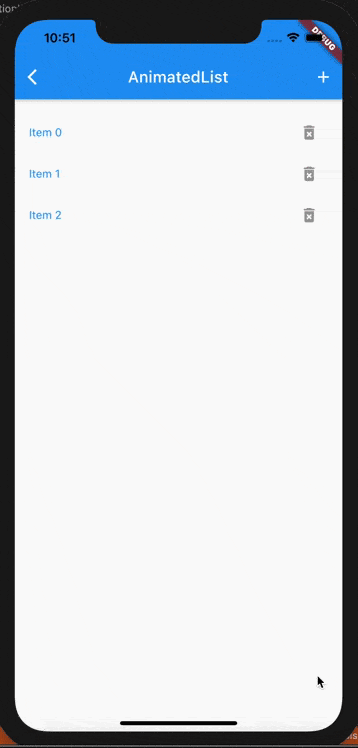您好,登录后才能下订单哦!
这篇文章主要介绍了Android如何实现列表元素动态效果的相关知识,内容详细易懂,操作简单快捷,具有一定借鉴价值,相信大家阅读完这篇Android如何实现列表元素动态效果文章都会有所收获,下面我们一起来看看吧。
列表是移动应用中用得最多的组件了,我们也会经常对列表元素进行增加或删除操作,最简单的方法是列表数据变动后,直接 setState 更新列表界面。这种方式存在一个缺陷就是列表元素会突然消失(删除)或出现(添加),当列表元素内容接近时,我们都没法知道操作是否成功了。而如果能够有动效展示这个消失和出现的过程,那么体验就会好很多,比如下面的这种效果,删除元素的时候,会有个逐渐消失的动画,而添加元素的时候会有渐现效果。

AnimatedList.gif
这里使用到的就是 AnimatedList,本篇文章的示例代码主要来自官方文档:AnimatedList 组件。需要注意的是,毕竟列表带了动画效果,对性能肯定会有影响,建议只对需要对元素进行删除、增加操作的小数据量的列表使用。
AnimatedList 是 ListView 的替代,构造函数基本上和 ListView 一致。
const AnimatedList({
Key? key,
required this.itemBuilder,
this.initialItemCount = 0,
this.scrollDirection = Axis.vertical,
this.reverse = false,
this.controller,
this.primary,
this.physics,
this.shrinkWrap = false,
this.padding,
this.clipBehavior = Clip.hardEdge,
})不同的地方在于 itemBuilder 的定义不同,itemBuilder 与 ListView 相比,多了一个 animation 参数:
typedef AnimatedListItemBuilder = Widget Function( BuildContext context, int index, Animation<double> animation );
animation是一个 Animation<double>对象,因此可以使用 animation 来构建元素的过渡动画。比如我们这里的示例就使用了 FadeTransition 来构建列表元素,从而有渐现效果。
class ListItem extends StatelessWidget {
const ListItem({
Key? key,
required this.onRemove,
required this.animation,
required this.item,
}) : super(key: key);
final Animation<double> animation;
final ValueChanged onRemove;
final int item;
@override
Widget build(BuildContext context) {
return Padding(
padding: const EdgeInsets.all(2.0),
child: FadeTransition(
opacity: animation,
child: Container(
child: Row(children: [
Expanded(
child: Text(
'Item $item',
style: TextStyle(
color: Colors.blue,
),
),
),
IconButton(
onPressed: () {
onRemove(this.item);
},
icon: Icon(Icons.delete_forever_rounded, color: Colors.grey),
),
]),
),
),
);
}
}使用 AnimatedList 时,我们需要调用 AnimatedListState 的insertItem 和 removeItem 方法来操作,而不能直接操作完数据后刷新界面。也就是在插入和删除数据的时候,应该是先修改列表数据,然后再调用AnimatedListState的 insertItem 或 removeItem 方法来刷新列表界面。例如删除元素的代码:
E removeAt(int index) {
final E removedItem = _items.removeAt(index);
if (removedItem != null) {
_animatedList!.removeItem(
index,
(BuildContext context, Animation<double> animation) {
return removedItemBuilder(removedItem, context, animation);
},
);
}
return removedItem;
}这里 removedItem接收两个参数,一个是要移除元素的下标,另一个是一个构建移除元素的方法 builder。之所以要这个方法是因为元素实际从列表马上移除的,为了在动画过渡时间内还能够看到被移除的元素,需要通过这种方式来构建一个被移除的元素来感觉是动画删除的。这里也可以使用 animation 参数自定义动画效果。insertItem 方法没有 builder 参数,它直接将新插入的元素传给 AnimatedList 的 builder 方法来插入新的元素,这样能够保持和列表新增元素的动效一致。
由于 AnimatedList 的所有控制都是在 AnimatedState 中进行的,而 AnimatedState 对象没法直接获取得到,因此需要使用 GlobalKey 来获取 AnimatedListState 对象。在构建 AnimatedList 的时候给 key 属性传入一个 GlobalKey,。然后就可以通过 currentState 获取到 AnimatedListState 对象了。
class _AnimatedListSampleState extends State<AnimatedListSample> {
final GlobalKey<AnimatedListState> _listKey = GlobalKey<AnimatedListState>();
late ListModel<int> _list;
late int _nextItem;
@override
void initState() {
super.initState();
_list = ListModel<int>(
listKey: _listKey,
initialItems: <int>[0, 1, 2],
removedItemBuilder: _buildRemovedItem,
);
_nextItem = 3;
}
Widget _buildRemovedItem(
int item, BuildContext context, Animation<double> animation) {
return ListItem(
animation: animation,
item: item,
onRemove: _remove,
);
}
// Insert the "next item" into the list model.
void _insert() {
final int index = _list.length;
_list.insert(index, _nextItem++);
}
// Remove the selected item from the list model.
void _remove(item) {
if (item != null) {
_list.removeAt(_list.indexOf(item!));
}
}
@override
Widget build(BuildContext context) {
return Scaffold(
appBar: AppBar(
title: const Text('AnimatedList'),
actions: <Widget>[
IconButton(
icon: const Icon(Icons.add),
onPressed: _insert,
tooltip: '添加',
),
],
),
body: Padding(
padding: const EdgeInsets.all(16.0),
child: AnimatedList(
key: _listKey,
initialItemCount: _list.length,
itemBuilder: (context, index, animation) {
return FadeTransition(
opacity: animation,
child: ListItem(
onRemove: _remove,
animation: animation,
item: _list[index],
),
);
},
),
),
);
}
}关于“Android如何实现列表元素动态效果”这篇文章的内容就介绍到这里,感谢各位的阅读!相信大家对“Android如何实现列表元素动态效果”知识都有一定的了解,大家如果还想学习更多知识,欢迎关注亿速云行业资讯频道。
免责声明:本站发布的内容(图片、视频和文字)以原创、转载和分享为主,文章观点不代表本网站立场,如果涉及侵权请联系站长邮箱:is@yisu.com进行举报,并提供相关证据,一经查实,将立刻删除涉嫌侵权内容。